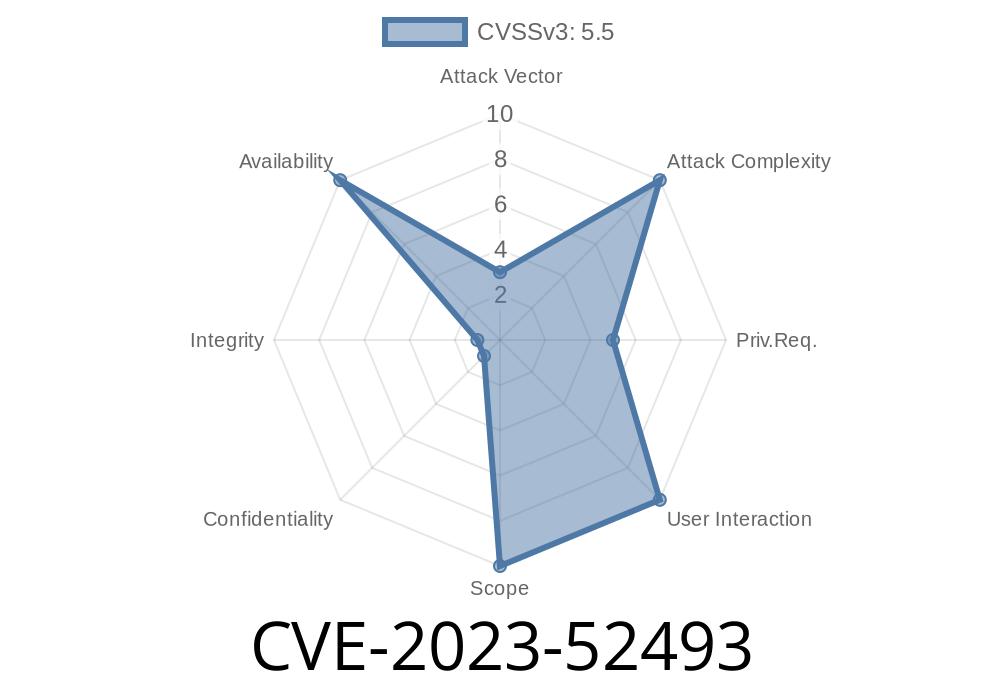In January 2024, a critical bug in the Linux kernel was patched under CVE-2023-52493. This bug wasn’t in a flashy or widely misunderstood subsystem, but rather the seemingly under-the-radar Mobile Host Interface (MHI) host driver—yet it could cause real headaches, potentially hanging entire systems.
In this long post, we’ll dig into what caused CVE-2023-52493, show you the code, explain the lockup problem, and walk through the details of the fix. If you’re a developer, sysadmin, or just a Linux sleuth who wants to know how kernel locking can go wrong, this is for you.
What Is MHI?
The Mobile Host Interface (MHI) is a protocol used by Qualcomm and some other system-on-chip vendors, for high-speed communication between the host (Linux in this case) and modems or other peripheral devices.
The relevant Linux kernel code lives in drivers like drivers/bus/mhi/host/, mostly used on devices using Qualcomm Snapdragon chips. But even if you’re not in that ecosystem, the lessons here are about correct kernel synchronization—something everyone who touches kernel code needs to understand.
Problem Summary
When queuing a buffer from inside a network event handler, the MHI driver could take multiple locks incorrectly and cause a system “soft lockup”—meaning the CPU spins forever, and the system stops responding.
Tech Talk, Simplified
- Locks: The MHI channel has read and write locks (think: “don’t touch this while I’m reading!” vs. “nobody can touch this while I’m writing!”).
- Chained Locking: The parse_xfer_event() function took a *read* lock. It then would call out to *client callbacks*. If the callback tried to queue more buffers, it would also try to take a *write* lock, while the read lock was still held—classic deadlock setup.
- Soft Lockup: Deadlocking or spinning endlessly, these are called “soft lockups” in kernels—a dangerous kind of unresponsiveness which can freeze entire systems.
Let’s look at the simplified vulnerable code, especially parse_xfer_event()
// Vulnerable pseudo code from MHI host driver
void parse_xfer_event(struct mhi_controller *mhi_cntrl, struct mhi_chan *chan, /* ... */) {
// Acquires the channel read lock
read_lock(&chan->lock);
// ... does some parsing logic
// This calls a callback, e.g.,
chan->xfer_cb(buf, ctx);
// If callback tries to queue buffer:
// --> write_lock(&chan->lock); [DEADLOCK!]
read_unlock(&chan->lock);
}
What Went Wrong?
- The driver assumes that calling client code (via callback) is *safe* inside a lock—*bad assumption*.
- If that callback then tries to queue a buffer (which calls write lock), you now have read+write locked by the same thread—deadlock or infinite spin.
Soft lockups: Whole systems could appear "frozen" until reboot.
- Security risk: While not directly an exploit-of-root, causing system hang is a denial of service.
The Official Fix
The fix is a classic: "Drop the lock before handing control to others."
The upstream patch was authored by Manivannan Sadhasivam (commit link).
Here’s the simplified correct pattern
void parse_xfer_event(struct mhi_controller *mhi_cntrl, struct mhi_chan *chan, /* ... */) {
read_lock(&chan->lock);
// Parse event logic...
read_unlock(&chan->lock);
// Now, *outside the lock*, call the callback:
chan->xfer_cb(buf, ctx);
// If callback queues buffer with write_lock, that's safe!
}
Real Patch Diff (Simplified)
- read_lock(&chan->lock);
- // ... something ...
- chan->xfer_cb(buf, ctx);
- read_unlock(&chan->lock);
+ read_lock(&chan->lock);
+ // ... parse event ...
+ read_unlock(&chan->lock);
+
+ // Call callback outside the lock
+ chan->xfer_cb(buf, ctx);
Exploit Details: Is This "Hacker-Friendly"?
This isn’t your classic “exploit and get root” bug. However, *any* process that can trigger enough channel events (e.g., as an unprivileged user via networking or peripheral interface, especially on embedded or Android devices) could hang the device, making this a denial-of-service vector.
Minimal Exploit Scenario
Suppose your code (or an attacker’s code) is given a way to register an MHI client, and you write a callback like this:
void my_xfer_cb(/* ... */) {
// Naively try to queue buffers... triggers write lock!
mhi_queue_buffer(chan, buf);
}
If parse_xfer_event() called this callback *inside* a read lock, the deadlock hits and your device stops responding.
References and More Reading
- CVE-2023-52493 on cve.org
- NVD entry for CVE-2023-52493
- Upstream Linux kernel commit
- Linux kernel source: drivers/bus/mhi/host/
How to Protect Yourself
- Update your kernel: Ensure your system has Linux kernel version with the patch merged (mainline as of v6.7 or stable series after early January 2024).
- Don’t hold locks across callbacks: If you write kernel code, learn from this—never call out (especially to unknown or client code) while holding locks.
In Conclusion
CVE-2023-52493 wasn’t about clever privilege escalation, but about what might seem a simple mistake: trusting callbacks inside locks. The lesson? Kernel synchronization is hard, and small mistakes can hang whole systems. Even if you’re not writing drivers, understand the risks: bad lock usage can be as dangerous as any memory bug.
Always keep locks and callbacks carefully separated.
*If you want to go deeper, read the relevant kernel patch and check the kernel’s bus: mhi: host codebase to see how these patterns are implemented.*
Timeline
Published on: 03/11/2024 18:15:16 UTC
Last modified on: 12/12/2024 15:57:46 UTC
